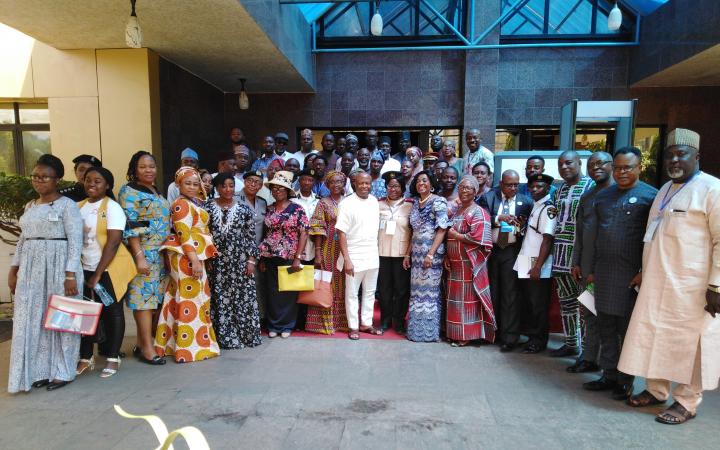21 – 24 January 2020, Abuja, Nigeria - In the bid to strengthen the capacities of key stakeholders in Nigeria, particularly government officials and relevant organizations, on how to deliver their mandate effectively and make more positive developmental impact, the United Nations Institute for Training and Research (UNITAR) with the support of the Norwegian Government through Embassy of Norway organized a 4-day Collaborative Leadership Training cum-Seminar recently in Abuja.
The event, which held at the Reiz Continental Hotel, Central Business Area of Abuja, Federal Capital Territory of Nigeria, started on the 21st and ended on 24th of January, 2020 with over 50 participants in attendance.
Participants were drawn from various relevant organizations such as: Federal Ministry of Transportation, Nigeria Meteorological Agency, Federal Ministry of Humanitarian Affairs, Disaster Management and Social Development; Federal Ministry of Petroleum Resources, National Orientation Agency, National Boundary Commission, Nigerian Red Cross, Institute for Humanitarian Studies and Social Development, Federal Road Safety Commission, the Nigerian Police, the Nigerian Custom Service, the MOT and other key stakeholders.
The Seminar focused on Goal 17 of the Sustainable Development Goals (SDGs) which cantered on building and strengthening Global partnership for result.
At the end of the seminar, a communique was issued.
In his opening remarks, Manager UNITAR Nigeria Project Office (NPO), Dr Larry Boms advised participants to replicate and step down the knowledge acquired at the Seminar. He pointed out that the era has come where we need to adopt a paradigm shift from the status-quo of business as usual; where government agencies would not want to network, partner or share project or policy ideas with their sister organizations. He further stated that today’s leaders must embrace the principles of collaboration in order to achieve accelerated development in tandem with the sustainable development goals.
In his address, the Minister of Transportation, Mr Rotimi Amaechi, represented by Ms Anthonia Ekpa, a Director in the Ministry, stated that “We cannot push the public service to achieve the economic agenda of government and other policies without working as a team; most of the reasons that affect our governance structures at all level are that we do not want to share.”
Facilitated by two experienced resource persons, the programme included presentation of papers, experience sharing, syndicate group work, and review of case studies.
The seminar began with an introductory session which provided opportunity for participants to highlight their expectations. Participants were unanimous on the need to broaden their knowledge on collaboration and learn how to collaborate effectively.
The seminar was highly interactive and participatory, and attendees shared their thoughts and experience on different elements of collaborative leadership discussed including the following: General principles and fundamentals of leadership; Collaboration – Meaning and its essence; range of partner interactions; Strategic communication for collaborative leadership, Barriers to collaboration and overcoming the barriers, Leadership, management development and effective collaboration; and Review of three (3) case studies. Also, an introductory session on the post-2015 agenda highlighted the need for effective collaboration in achieving the SDGs.
Class leadership nomination was sought, and five syndicate groups were formed. The Group exercises and presentations within a collaborative context discussed the following topics:
- Reduction of carbon emission by 25% by 2023
- Developing a strategy and action plan to allow for collaboration. This focussed on SDG Climate Change focal area.
The group exercises and case studies helped to embed important considerations such as cost, benefits, justification and other contending issues regarding effective collaboration and leadership.
In general, considering the various expectations expressed by attendees at the commencement of the seminar, the seminar content, the level of engagement and delivery method, there was a good match between expectations and content delivered.


